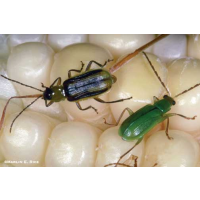More Than Three-Quarters of Soybeans, Corn and Cotton Grown in U.S. are Genetically Engineered
 Rootworms on corn (photo: Marlin E. Rice, Iowa State University)
Rootworms on corn (photo: Marlin E. Rice, Iowa State University)
New agricultural figures out of Washington show that genetically engineered crops now overwhelmingly dominate the yields of America’s production of soybeans, corn and cotton. But the industry’s embrace of what critics call “frankencrops” has already started to backfire for at least one of these staples.
First the numbers: crops modified by scientists to be herbicide-tolerant (HT) are now just about everywhere on U.S. farms.
The U.S. Department of Agriculture (USDA) says that 93% of all soybeans in the country were the HT variety as of last year. HT cotton comprised 82% of that crop in 2013, while HT corn dominated 85% of that crop’s acreage last year.
Another type of modified corn contains the gene from the soil bacterium Bt (Bacillus thuringiensis), which makes the plant toxic to certain pests, like the rootworm. Going with Bt corn allowed farmers to use less insecticide, reduce costs and curtail environmental pollution. That’s why Bt corn became so popular, making up 76% of all corn acreage in 2013.
But many scientists warned after the Bt modification was introduced that insects weren’t going to just go away and not munch on these plants anymore. Nature, after all, is big on adaptation, and that’s what the rootworm has done.
A new study published in the Proceedings of the National Academy of Sciences says rootworms have developed a resistance to the Bt gene—which means they can go back to eating modified corn.
“Unless management practices change, it’s only going to get worse,” Aaron Gassmann, an Iowa State University entomologist and coauthor of the study, told Wired. “There needs to be a fundamental change in how the technology is used.”
In the meantime, farmers confronted with Bt-resistance rootworms will have only one choice to protect their corn crop—spray more pesticides, which Bt corn was supposed to mitigate.
-Noel Brinkerhoff
To Learn More:
Recent Trends in GE Adoption (by Jorge Fernandez-Cornejo, U.S. Department of Agriculture)
Voracious Worm Evolves to Eat Biotech Corn Engineered to Kill It (by Brandon Keim, Wired)
Biotech Firms Slip in Amendment Allowing USDA to Overrule Courts on Genetically Engineered Crops (by Noel Brinkerhoff, AllGov)
Every Year, Americans Eat more than their Weight in Genetically Engineered Foods (by Noel Brinkerhoff and David Wallechinsky, AllGov)
- Top Stories
- Unusual News
- Where is the Money Going?
- Controversies
- U.S. and the World
- Appointments and Resignations
- Latest News
- Trump Orders ICE and Border Patrol to Kill More Protestors
- Trump Renames National Football League National Trump League
- Trump to Stop Deportations If…
- Trump Denounces World Series
- What If China Invaded the United States?






Comments